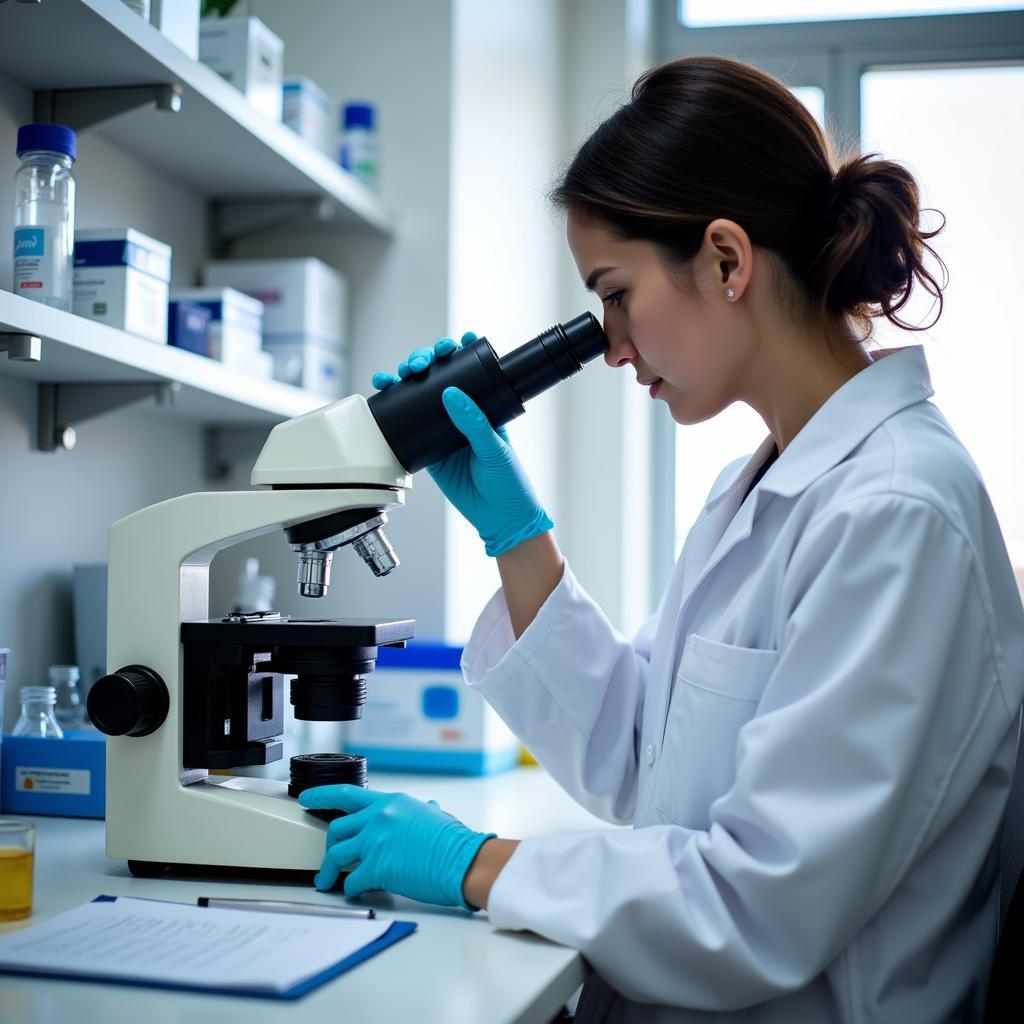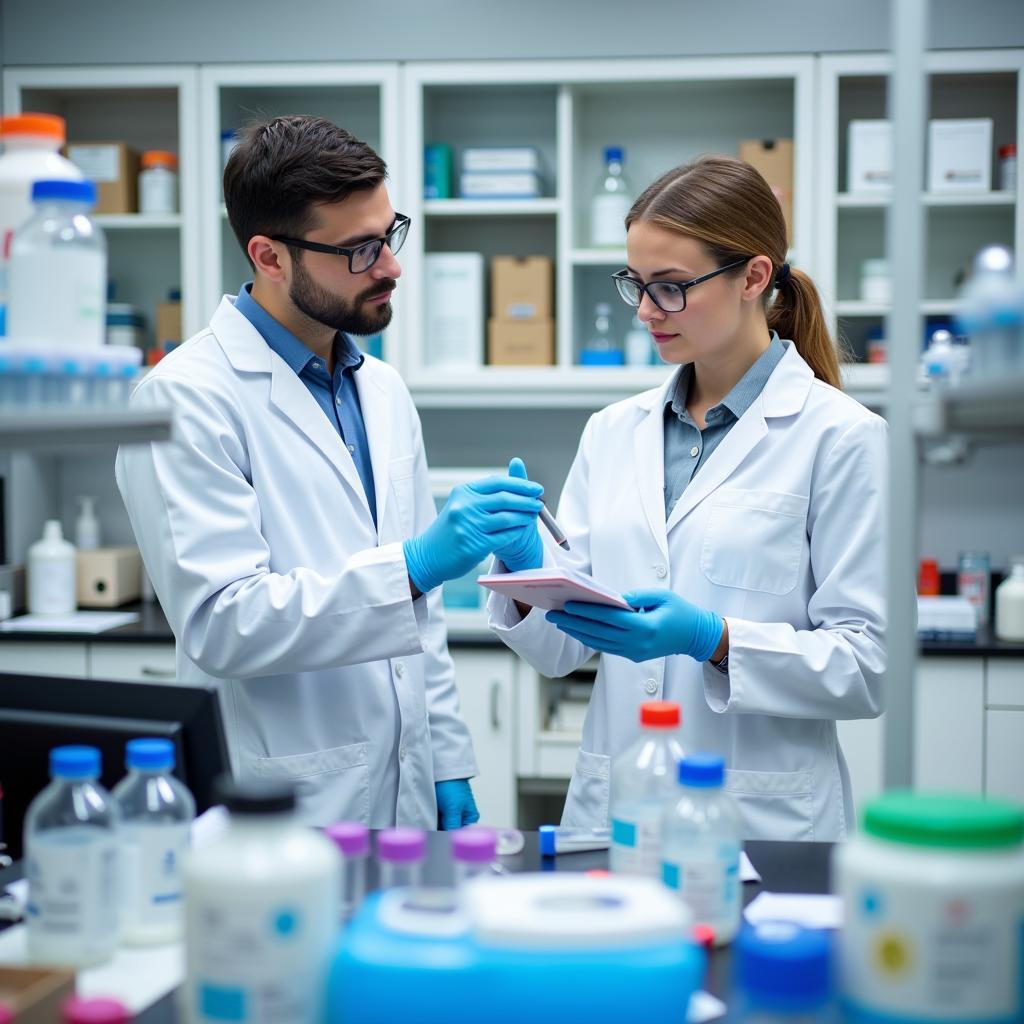If you’re intrigued by the world of medicine but prefer working behind the scenes, a career as a Medical Laboratory Technician might be your calling. But what exactly is this profession called in English, and what does it entail?
This article delves into the intricacies of this vital healthcare role, exploring the required education, skills, and career prospects. We’ll uncover the answer to the question, “Chuyên Ngành Xét Nghiệm Y Học Tiếng Anh Là Gì,” and shed light on this rewarding career path.
Unraveling the Terminology: Medical Laboratory Technician in English
“Chuyên ngành xét nghiệm y học” translates directly to Medical Laboratory Science or Clinical Laboratory Science in English. Professionals in this field are known as Medical Laboratory Technicians (MLTs) or Clinical Laboratory Technicians (CLTs).
These skilled individuals play a critical role in healthcare by performing various laboratory tests that aid in diagnosing, treating, and monitoring patients.
The Vital Role of a Medical Laboratory Technician
Medical Laboratory Technicians are the backbone of healthcare diagnostics. They work in hospitals, clinics, private laboratories, and research facilities, performing a wide range of tasks, including:
- Analyzing blood, tissue, and other bodily fluids: MLTs examine samples to detect abnormalities, identify diseases, and monitor patient health.
- Performing blood tests: From routine complete blood counts (CBCs) to specialized tests like blood typing and coagulation studies, MLTs handle various blood analyses.
- Analyzing urine and other body fluids: Urinalysis, stool analysis, and cerebrospinal fluid analysis are some of the tests MLTs conduct to diagnose infections, kidney disorders, and other conditions.
- Culturing bacteria: Identifying microorganisms in patient samples helps determine the cause of infections and guide appropriate antibiotic treatment.
- Operating sophisticated laboratory equipment: MLTs are proficient in using microscopes, centrifuges, spectrophotometers, and other specialized instruments to perform accurate analyses.
 Medical Laboratory Technician Analyzing Samples
Medical Laboratory Technician Analyzing Samples
Educational Pathway to Becoming a Medical Laboratory Technician
To embark on a career as a Medical Laboratory Technician, aspiring individuals typically need to complete an accredited associate’s degree program in Medical Laboratory Science or a related field.
These programs equip students with a strong foundation in:
- Clinical chemistry: Understanding the chemical components of bodily fluids.
- Hematology: Studying blood and blood-forming tissues.
- Microbiology: Identifying and analyzing microorganisms.
- Immunology: Exploring the immune system and its response to diseases.
Essential Skills for Success as a Medical Laboratory Technician
Beyond technical expertise, successful Medical Laboratory Technicians possess a unique blend of skills, including:
- Attention to detail: Accuracy is paramount when handling patient samples and interpreting results.
- Analytical skills: MLTs must analyze data, identify patterns, and troubleshoot issues that may arise during testing.
- Communication skills: Effectively communicating test results to physicians and other healthcare professionals is crucial.
- Teamwork: Collaborating seamlessly with colleagues in a fast-paced laboratory setting is essential.
Career Prospects and Growth Opportunities
The demand for skilled Medical Laboratory Technicians continues to grow as the healthcare industry expands and advancements in diagnostic testing emerge.
Graduates can explore diverse career paths, including:
- Hospital laboratories
- Clinical laboratories
- Physician’s offices
- Research facilities
- Public health laboratories
 Medical Laboratory Technicians Collaborating in Lab
Medical Laboratory Technicians Collaborating in Lab
With experience and further education, MLTs can advance to supervisory roles, pursue specialization in areas like molecular diagnostics or blood banking, or even transition into research or education.
Conclusion
The field of Medical Laboratory Science offers a fulfilling and impactful career path for individuals passionate about science and healthcare. As we’ve uncovered, “chuyên ngành xét nghiệm y học tiếng anh là gì” leads us to the term “Medical Laboratory Science,” a profession where skilled technicians play a vital role in patient care and medical advancements.
If you have a keen eye for detail, a love for scientific exploration, and a desire to make a difference in healthcare, becoming a Medical Laboratory Technician might be the perfect fit for you.
FAQs about Medical Laboratory Technicians
1. What is the average salary of a Medical Laboratory Technician?
The salary of an MLT can vary based on location, experience, and employer. However, the average annual salary in the United States is around $50,000.
2. How long does it take to become a Medical Laboratory Technician?
An associate’s degree program in Medical Laboratory Science typically takes two years to complete.
3. Is certification required to work as a Medical Laboratory Technician?
While not always mandatory, certification demonstrates professional competency and can enhance job prospects.
4. What are some of the challenges faced by Medical Laboratory Technicians?
Working with potentially infectious materials, dealing with high-pressure situations, and the repetitive nature of some tasks can be challenging.
5. What are some related careers to Medical Laboratory Technician?
Related career paths include Medical Technologist, Medical Laboratory Scientist, and Pathology Assistant.
Other Resources for Aspiring Healthcare Professionals
Interested in exploring other healthcare careers? Check out these articles:
- Các trường đại học dưới 20 điểm ở hà nội
- Cao đẳng nghề du lịch sài gòn học phí
- App học tiếng anh với người bản xứ
- Các trường liên kết với đại học quốc tế
- Các trường đại học ở bình thạnh
For any inquiries or support, feel free to contact us:
Phone: 0705065516
Email: thptquangtrung@gmail.com
Address: NB tổ 5/110 KV bình thường b, P, Bình Thủy, Cần Thơ, Việt Nam
Our dedicated team is available 24/7 to assist you!

